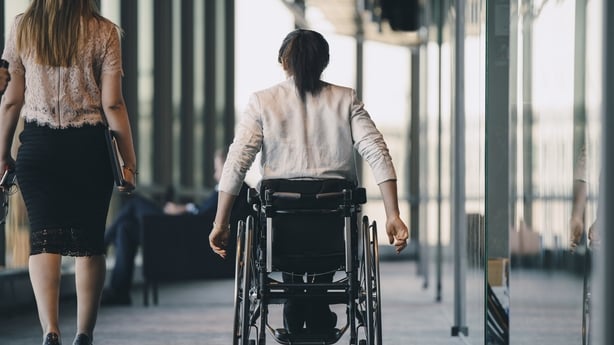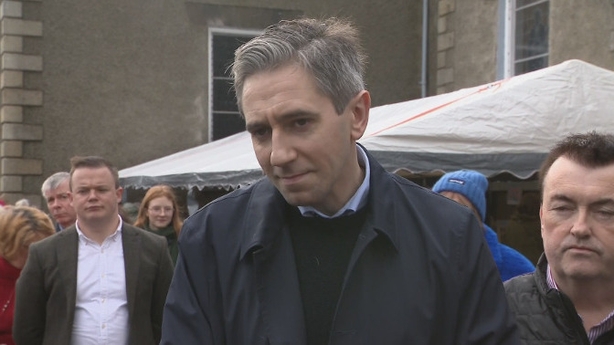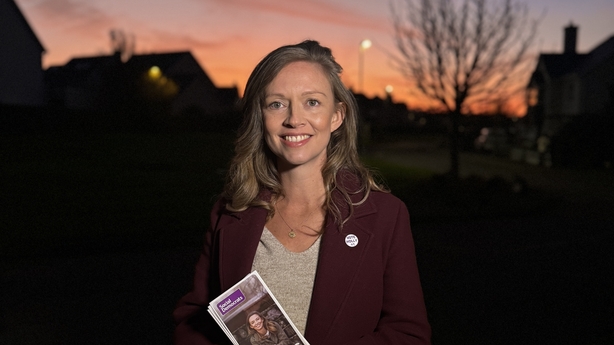Ireland is a challenging place for people with disabilities.
A lack of planning, investment and foresight by successive governments has led to significant pressure for those reliant on the sector and the people who work in it.
Here, Ailbhe Conneely, looks at some key issues facing disabled people, their families and those who care for them.
The encounter between Fine Gael leader Simon Harris and a care worker in Cork last night has led to commentary about Section 39 pay.
However, it is important to point out that the woman in question was highlighting both the issue of pay and wider problems in the disability sector.
Those who have experience of that sector will not be surprised with her assessment that people are "suffering".
There is an inconvenient truth that there has been a failure by successive governments to sufficiently prioritise, plan or budget for the disabled community in Ireland and the results of that are evident.
There are over a million people with a disability of long-term condition in the State.
In addition, there are also carers, personal assistants and disability sector workers.
Pandemic lifted veil on restrictions facing disabled
A veil was lifted during the Covid-19 pandemic on the impact that restrictions have on daily life.
This was something most disabled people had dealt with all their lives as outlined in a 2022 ESRI report which highlighted that a lack of personal assistance hours meant some disabled people were "effectively confined to their homes".
That was if they were lucky enough to secure a home suitable for their needs.
Another 2022 report found that some local authorities failed to cater for the particular needs of disabled people by offering inappropriate housing options.
This resulted in younger people being forced to live in nursing homes as outlined by the Ombudsman in 2021.
The ‘Wasted Lives’ report stated that more than 1,300 people under the age of 65 were living in nursing homes inappropriate for their needs.
Today, the figure is just over 1,200.
Watch: Harris' tense exchange with care worker in Kanturk
The Labour Party has used its manifesto to advocate for the right to independent living for people with disabilities, including more accessible housing and services that allow people to live independently in their communities.
Fine Gael has stated in its manifesto that it will drive implementation of the 'Time to Move on from Congregated Settings' strategy.
The Ombudsman’s report was published during Covid-19 and for a large cohort, it was a traumatising time.
The closure and reduction of day services had a serious impact on the mental health of people with disabilities, their families and carers.
People lost access to the social interaction, structure and the routine they required, leading to isolation, anxiety and a loss of confidence and skills.

Carers were exhausted and riddled with anxiety. Many remain burned-out today and this was at the heart of the exchange between the carer in Cork and the Taoiseach.
The move to decongregate settings - enabling adults with disabilities to independently live in residential settings in communities with support as needed - has not kept pace with demand.
As a result, more than 1,900 parents over the age of 70 are currently caring for their intellectually disabled sons and daughters at home. 471 are in their 80s and 90s.
The system is now functioning in an emergency capacity when really, despite it being an area that is relatively predictable in terms of needs.
Services should be in place by the time those with disabilities reach adulthood, but instead, if a person with a disability suddenly finds himself or herself alone due to the death of an ageing parent - a place must be sought.
With so few residential places available, this can result in them being plucked from their communities to a location over 100km away.
Read more:
Harris apologises to Kanturk care worker he walked away from
Latest Election 24 stories
Independent Ireland wants to see better accessibility to public services and facilities for people with disabilities, particularly in rural areas where services can be scarce.
Despite endless appeals for the matter to be rectified budget after budget, the problem is getting worse, according to organisations on the ground and they say this is down to lack of budgetary planning.
One of the issues that caused significant consternation amongst the disabled community in the past year was the green paper on disability.
The "exploratory" exercise by the Department of Social Protection proposed reforms of long-term disability payments through a tiered system.
There was significant concern over the proposal that a person's capacity to work would be medically assessed by the department.

The green paper resulted in numerous protests but within days of Mr Harris taking up the role as Taoiseach, it was scrapped.
The Department of Social Protection issued a statement to say it would not proceed with the process.
Advocating for people with disabilities was something that led the Fine Gael leader into politics, and for many disabled people, scrapping the green paper was proof of this intention.
However, one action does not dilute the inequalities faced by disabled people or the parents of children with disabilities in this country.
There are election candidates who are parents running on the platform of disability issues, highlighting the difficulties that disabled people face in Ireland.
People Before Profit want a rights-based approach to disability policy, ensuring that all people with disabilities have equal access to healthcare, education, and employment opportunities.
Sinn Féin has also proposed universal access to services, to ensure support is provided across all areas of life for those with disabilities.
Most of the parties have also sought to address another issue in their manifestos which is causing havoc nationwide and that is the crisis in children’s disability services.

Over 12,000 are awaiting an assessment of needs (AON), which is the first step in securing supports for children with disabilities in Ireland.
Under law, an AON must be carried out within three months of an application to enable the child receive immediate interventions. Part of the process involves assessing educational needs.
A high court ruling found this aspect of the assessment did not meet requirements under the Disability Act and so, the waiting list grows.
Many of the parties including Fianna Fáil and the Social Democrats have said they will reduce waiting lists for assessments, the latter announcing the establishment of a Department of Disability as a red line issue, should they end up in coalition talks.
Parents of children with autism and other additional needs have also faced extreme difficulties in finding school places for their children.
During the summer, one mother broke down on social media after her child was refused a place at another school due to capacity.
The Green Party has said it will prioritise inclusive education, with a focus on ensuring that children with disabilities have access to mainstream schools and the necessary supports.
Returning to the Cork encounter on Friday evening and the issue of pay raised by the Section 39 worker.
Watch: Harris apologises to care worker he walked away from
Currently, a lack of pay parity has affected both staff, and the people they support.
Talks have been taking place in the Workplace Relations Commission between Government and the Unions to address the lack of parity in pay for Section 39 workers compared with Section 38 and HSE workers who do the same work.
The talks were due to proceed on last Monday, but they were postponed and a new date is awaited.
The frustration among carers is understandable and evident.
Disability is a sector that feeds into so many homes across the country - be it workers, service users or their families - it cannot be underestimated.
Despite an increase in money directed towards disability in recent budgets, it appears that the fruits of this are not being seen on the ground, and this is something many want to see rectified.







